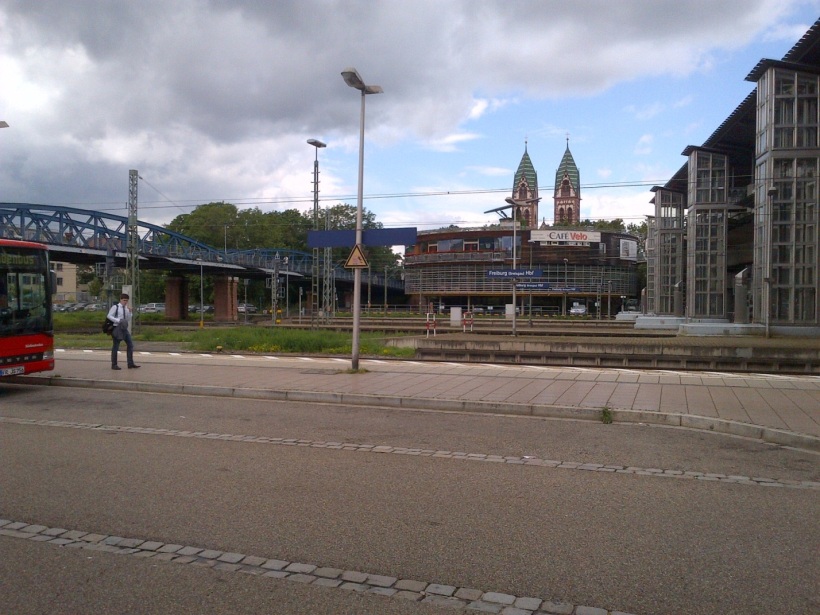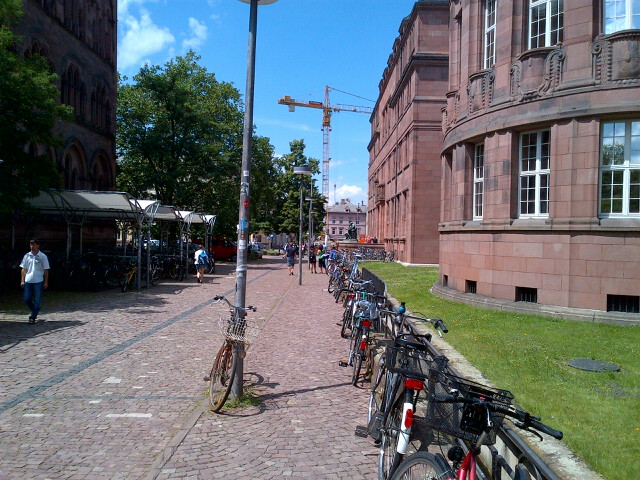A UConn “Sustainability Exchange” Experience – Bicycle Transportation in Freiburg, Germany
Preparing for my trip, I had read that Freiburg, a large college town by any standard (pop. 220,000), and an increasingly popular tourist destination for all of Europe, the US and other parts of the world, was not only Germany’s “solar city,” which makes sense given that it enjoys more sunny days than anywhere else in Deutschland, but also its “cycle city.” With this in mind, I had packed my bike helmet, gloves and shorts and made plans to rent a bike at The Mobile. This is a large, multi-story facility, which was built to serve as the city’s public bike station and is connected by a pedestrian bridge to the train and bus stations. I had read that as many as 30 percent of Freiburgers commute to work, class, and almost anywhere else they’re going, by bicycle – that number seems lower than what I observed.
“The Mobile,” a public bike station in Freiburg, rents and loans hundreds of bikes daily.
The easiest way to describe the difference between biking in Freiburg and the US, even compared to a college town like Storrs, is that bicycling here in southwest Germany, among students and the masses, is predominantly an alternative mode of transportation, certainly much more than it is a form of recreation or sport. Bikes here are mostly very practical, low-frills models with wider hybrid tires and seats, straight handlebars, and metal basket clips and fenders. In fact, most of them resemble the standard-issue “UConn Cycles” bike-sharing 3-speed models (the kind we selected to deter their theft). The expensive, aerodynamic bikes so popular in the US, like the ultra-light racing bikes, are few and far between. Upscale mountain bikes with the heavy-duty shock absorbers and hydraulic brakes are slightly more noticeable on the Black Forest’s wooded trails, which border the city and climb up to many scenic hilltops and steep “bergs.” People of all ages ride everywhere, rain or shine, day or night, in their normal everyday attire: from business suits and ties, to long dresses, skirts and skinny jeans, and with footwear from dress shoes, sneakers, sandals and boots, to bare feet. Helmets and spandex bike shorts, so popular among the “weekend warriors” in the US (myself included) are scarce in Freiburg.
The Mobile is connected by the pedestrian/bike-only bridge (left) to the main bus and train stations.
Biking here on the Freiburg Uni campus and in the city is all about getting where you need to go… quickly. My $4 Freiburg metropolitan area bike map, with the solid red lines indicating separate, paved bike trails, and dotted lines for pavement-marked lanes alongside the walkways or on the shoulders of streets, showed a network of trails so numerous and inter-connected that it looked like a half-eaten plate of spaghetti. It’s all so convenient and connected that the university has found 5,000 bike racks on campus are not enough! According to Dr. Juergen Steck, my host and counterpart at the university, this has become a problem for senior administrators, because hundreds of bikes are routinely locked to lamp posts, fences, trees and anything else fixed to the ground, becoming an eyesore and occasionally even a fire safety issue when blocking exits and access points. Help is on the way! The university will be adding 500 bike parking spaces in the basement of its new library, now under construction and expected to open next year.
5,000 bike storage racks on the Freiburg Uni campus, such as the covered racks to the left in this photo, are still not enough! Bikes are chained to everything, like the railings and lamp posts in front of this classroom building, posing aesthetic and safety concerns.
A note about bike safety is relevant here. Many times last year, when our UConn Cycles team prepared to launch the campus bike-sharing pilot program, I heard from several faculty and staff members about how they had almost been run over by a careless cyclist. They chided me that maybe encouraging more bikes on campus wasn’t such a good idea after all. So, we created a bike safety flyer, tightened our liability waiver form, took a deep breath and forged ahead. Fast forward to southwest Germany in this summer of 2012 and picture dozens, if not hundreds, of bikes fearlessly zipping along the streets and narrow cobblestone roads and walkways, often weaving through pedestrian and vehicle traffic that is every bit as heavy as it gets on North Eagleville Road (in the Science Quad) between classes, and you’ll have a pretty good image of Freiburg. Cars, bikes and pedestrians here have learned to peacefully coexist. Everyone defers to cyclists, who seem pretty attentive and experienced at avoiding collisions. However, when I remarked to Freiburg’s director of education and the environment, Dr. Franziska Breyer, that I had seen very few riders, except for pre-teens, wearing bike helmets, she seemed resigned to the fact that an adult helmet law would not be enforceable. And yes, she acknowledged, they have had their share of bike-related accidents. Those must have been involving the few adults I saw now wearing helmets.
Bike taxis (and even a few passenger-pedaled buses) were popular in Freiburg’s beautifully restored and preserved Aldstadt (”Old City”), where motor vehicles were mostly prohibited.
Renting a bike was less expensive than in the US (finally something less expensive!) and cost about 8 euros ($10) for a half day or 15 euros for an entire day. The 50 euro refundable deposit made me thankful that I brought extra cash in my pack. Busy staffers at The Mobile quickly fetched a well-maintained 7-speed “city bike” from the well-stocked racks of similar bikes for rent. They demonstrated the rear wheel locking mechanism, with the key that could only be removed when the bike was stopped and locked (I made a mental note for UConn Cycles), then directed me to the Dreisam River trail and sent me on my way – no liability waiver form was presented for my signature and no helmet was offered.
The trail along the cascading river, stretching for miles in either direction beyond the city center, was simply one of the most scenic, smooth, uninterrupted and enjoyable bike paths I have ever ridden. The scenery transitioned seamlessly (see photos below) from busy city blocks, to suburban village-like districts, to sports fields and playgrounds, then under or over the autobahn and out to the bucolic farms with herds of goats and sheep, past acres of corn and wheat fields. There were plenty of intersecting bike trails along the way that I would have loved to explore. We headed west when we meant to go east to find the solar soccer stadium on the outskirts of the city, so had to double back and ended up riding for more than 20 miles, stopping occasionally to take pictures.
Once back within the city limits, we found lunch at a Turkish restaurant not far off the Dreisam River trail. While this ride was all very pleasant for me, I still didn’t get the impression that many of the locals were riding for pleasure. The vast majority appeared to be biking solely for transportation.
Freiburg proved to me that when biking becomes a lifestyle choice and serves as a mode of transit that literally replaces the use of cars and other motorized vehicles, the population becomes healthier. I’m no slouch on a bike but many of the locals, young and old, passed us as we pedaled along at our leisurely pace. I’ll admit that I found it a little bit frustrating that I couldn’t easily close the distance between myself and an elderly white-haired gentleman in jeans and a t-shirt, or a middle-aged woman in a long skirt, whom I guessed could have been heading to her apartment for a lunch break – not exactly like trying to make up ground on the peloton at the Tour de France. Between biking everywhere, and hiking and mountain climbing in the Black Forest, Freiburgers are in good shape! Or maybe it’s the local beer….
(Next – Part 3: Renewable Energy)









Pingback: Sustainability Exchange – Part 1: Public Transportation | Office of Environmental Policy
August 13, 2012 at 12:09 pm
Reblogged this on UConn EcoHouse.
April 6, 2014 at 10:43 am
Hi there it’s me, I am also visiting this website on
a regular basis, this web site is really nice and the viewers are in fact sharing good
thoughts.
August 1, 2014 at 12:36 am
Greetings! Quick question that’s totally off topic.
Do you know how to make your site mobile friendly?
My blog looks weird when viewing from my iphone4. I’m trying
to find a template or plugin that might be able to resolve this problem.
If you have any suggestions, please share. With thanks!
August 4, 2014 at 12:33 am
I am really grateful to the holder of this website who has shared this wonderful article at at this place.